
Click to Skip Ahead
The minute you smell rodent urine—you know it. It’s an undeniably strong and unpleasant odor that can linger for months and even years after the mouse or rat has moved on. And it seems the longer it sits, the more challenging it is to lift.
Fabrics, wood, upholstery, and just about any other surface can fall victim to rodent urine smells, even if you have pets that you regularly up clean up after. With mice and rats doing their business 50+ times a day, it can be challenging to keep up.
Let’s read about some solutions to this smelly issue, breaking things down by location.
Before You Start

Mouse and rat waste is incredibly dangerous to handle. Always make sure to put a layer of protection between you and the droppings or urine.
We recommend wearing thick disposable gloves so you don’t make contact with the urine. This is necessary for your protection, please wear a face mask as well.
Also, you will need some type of disinfectant for applicable areas. You can choose store-bought products or make your own, but sanitizing is the key to removing smells and bacteria.
So, in short, here are your possible needed supplies:
The 4 Methods on How to Clean Mouse & Rat Urine & Feces
1. Vehicles

If you have a vehicle that sits more than it’s driven, it isn’t unusual to see mouse and rat activity. You can’t really blame the little critters. Cars, campers, and other vehicles make pretty comfy shelters.
However, you won’t want them raising families or having little mouse communities in your vehicles. If you recently smelled mouse pee or found droppings, it’s time to act.
It can be difficult to find where they are hanging out.
Before any cleaning takes place, it’s crucial to remove any bedding or nest materials they have. Since diseases are prevalent and easily spread through waste, make sure to never touch the remnants with bare skin.
To remove smells from vehicles, we recommend a heavy-duty commercial cleaner to reduce the odors. Since it’s hard to tell how old the urine is, you might have to clean the area multiple times before you notice improvement.
If you don’t want to use a heavy-duty cleaner, you can use a bleach concoction measuring one part bleach to nine parts water. Use a spray bottle to cover thoroughly and evenly on affected surfaces.
Let the mixture sit for several minutes. You can use a rag or other abrasive surface to scrub problem areas, too.
If the mice or rats have made a home on the engine or air filtration system, you might have to dismantle certain parts of the vehicle to reach these spots.
If you aren’t too savvy with tools and such, you might want to get help from a friend or watch a few videos online for assistance.
2. Homes
It isn’t a bit unusual to see mice and rats in homes. Our homes are warm and cozy—plus, they have tons of food and nesting materials to choose from if they can just manage to stay out of sight.
You will likely have to set traps for mice and rats. While it may seem cruel, it’s best for the safety of your family. If you are against kill traps, you can buy live traps and relocate the rodents somewhere far from your home.
But keep in mind that where there’s one, there are usually many. If you choose any type of rat poison, make sure that your pets can’t access the product. This is dangerous for pets, especially if they catch or kill a poisoned mouse.
If you have found droppings, you need to take your sanitizing agent of choice and thoroughly saturate the area. Let it sit for roughly five minutes to completely eliminate germs from the area.
With gloves on, wipe up the spots, disposing of the paper towels or rags in garbage bags.
Again, you can use a commercial strength disinfectant or a bleach condition you make yourself.
Once you clean up droppings or urine, saturate the area again to disinfect—just to be safe.
- ADVANCED ENZYMATIC CLEANER - Penetrates the most stubborn smells and stains at the deepest molecular...
- FOR ANY MESS, ON ANY SURFACE - This pet odor eliminator cleans your carpets, floors, furniture,...
- FRESH, NATURAL ODOR - Our unique formulation doesn't rely on dangerous or unpleasant chemical...
If you're over your house smelling like you've got a pet, it's time to check out the Hepper Advanced Bio-Enzyme Pet Stain & Odor Eliminator Spray! It removes even the most stubborn smells and stains and comes with a 100% satisfaction guarantee. Click here to find out more about this amazing product.
At Pet Keen, we’ve admired Hepper for many years, and decided to take a controlling ownership interest so that we could benefit from the outstanding products of this cool cat company!
3. Outbuildings

Outbuildings can be pretty tricky. Rodents can usually access these buildings much more easily, making it nearly a guarantee that they will get in at some point or another.
You can already have safety measures in place, such as repellent and traps. However, rodents are pretty darn crafty and intelligent. They can bypass your measures despite your efforts.
If you smell urine or see droppings in your outbuilding, the process will be like the solutions above.
First, you need to try to do a little digging to see where they’re hiding and how they’re getting in to prevent future contamination.
Once you locate the nesting spots or affected areas, protect your skin, and clean up any materials, as necessary.
Using a commercial cleaner or bleach concoction, spray or saturate the affected areas. Do not just go to town on anything, as son surfaces and materials can’t get wet and might discolor.
4. Non-Washable Surfaces
What really stinks is when rodents do their business in areas you can’t so easily clean—like paper products and some other materials.
If you have some items that have been soiled and cleaner just isn’t a feasible option, it’s time to let the UV rays work their magic. Place these items in direct sunlight for up to 5 days.
This process will kill any bacteria that could lead to infection or disease. It might not take care of the smell, unfortunately, but it will eliminate the possibility of picking up a nasty virus through exposure.
Sunlight is especially effective against the hantavirus, which is really common in rodent waste.
Health Risks
Mice and rats can carry all kinds of potentially dangerous diseases in their feces and urine. If you make contact without realizing it, you risk contaminating yourself and others.
While it’s unlikely that you’re going to spread the black plague again, certain bacteria and diseases can be hazardous to humans and other pets.
Even domesticated rodents can carry diseases like their wild cousins. Some of these include tularemia, leptospirosis, and salmonella.
If you have pet rats or mice, always thoroughly wash your hands after handling them and keep their area clean. Also, when your pet is out of the enclosure, look for any waste messes and clean them up as needed.
Conclusion
If you notice mouse or rat waste, it is imperative to act right away. Rodents multiply rapidly and can become a full-blown infestation in just a few months. Once you clean up the urine and feces, remember to put a prevention method in place.
Remember, rodents (even our beloved pets) can carry some pretty wicked diseases in their waste. So, we simply can’t share the same living spaces for the safety of your hearth and home.
See also:
- Do Pet Rats Hibernate? What You Need to Know!
- Are Rats Nocturnal? Can They See in the Dark?
- How to Clean Mouse Urine from Wood (7 Ideas and Tips)
Featured Image Credit: Piqsels











